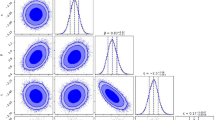Abstract
Nonzero cosmological constant favours cosmological models with larger Hubble constant. The evolution of ionization during decoupling period in a universe with nonzero cosmological constant is computed by using a corrected recombination coefficient. Also presented in this paper is the redshift distribution of the last scattering surfaces of the cosmic background photons while the cosmological constant is nonvanishing. Finally, we give a brief estimation about the influence of He on the last scattering surfaces.
Similar content being viewed by others
References
Freedman, W.L., et al.: 1994, Nature 371, 757.
Osterbrock, D.E.: 1989, Astrophysics of Gaseous Nebulace and Active Galactic Nuclei. Mill Valley, Calif. University Science Books.
Peebles, P.J.E.: 1968, Astrophys. J. 153, 1.
Peebles, P.J.E.: 1993, Principles of Physical Cosmology, Princeton University Press, Princeton, New Jersey.
Rights and permissions
About this article
Cite this article
Xiang, SP., Hong, FW. The Ionization Rate During the Decoupling Period in a Universe with Nonzero Cosmological Constant. Astrophysics and Space Science 253, 87–95 (1997). https://doi.org/10.1023/A:1000582206122
Issue Date:
DOI: https://doi.org/10.1023/A:1000582206122



